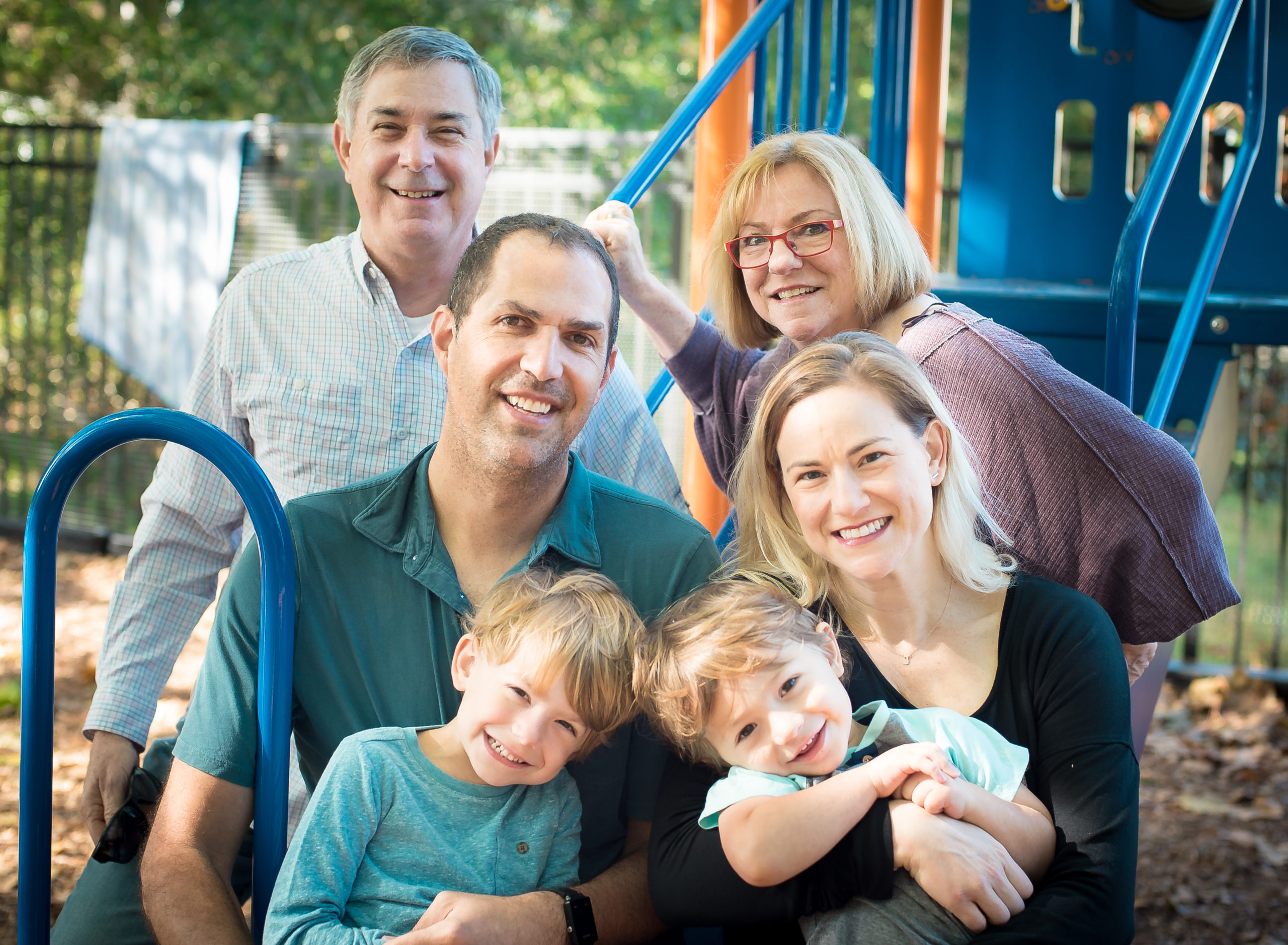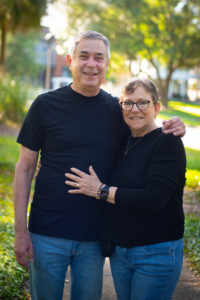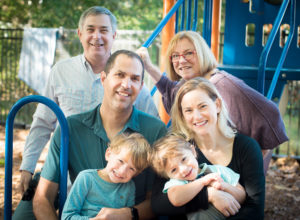A Tale of Two Lives – Surviving, fighting and educating through ovarian cancer
Known as one of the “silent killers,” ovarian cancer claims approximately 14,000 lives a year in the U.S., sparing no one … even children as young as two have crossed its path. With symptoms as benign as itching, back pain and lethargy, the beginning stages are often brushed aside, giving way to a heartbreaking late-stage diagnosis. With that diagnosis comes a will to fight … a will to live … and a will to conquer the disease.
Linda Bennett and Dr. Samantha Bacchus (featured previously) fought a late-stage ovarian cancer diagnosis. Their enemy: the cancer. Their weapons: chemotherapy, surgery, love and the strength of a 100-man army. Their lives, and the lives of their families, were forever changed by this disease. In the wake of the fight, there is hope that their journey will bring attention and awareness to this disease.
Part 2: Linda Bennett
Seven weeks after her passing, the loss of her presence can still be felt deeply by her family. At just 70 years old, and only 21 months after her diagnosis, Linda Bennett lost her courageous and hard-fought battle with ovarian cancer on December 21, 2021.
In many cases, the symptoms of ovarian cancer are non-specific, showcasing themselves as weight loss, fatigue, stomach pains or even constipation. In the days, months and possibly years leading up to a diagnosis, the cancer can hide itself among an array of “symptoms” all the while growing, leading to a late-stage diagnosis. Over the course of 3 months, Linda would be tested and treated for various illnesses before her cancer was officially diagnosed.
“The first time I remember her complaining of having problems was back in November of 2019 and it was while visiting friends in New Orleans for a few days. She was complaining of stomach and abdominal pains, they were just unusual,” recounts Phil Bennett, Linda’s husband of 49 years and co-owner of Sun Country Sports Center.
“She said it a couple of times while we were there. I didn’t know the extent of it.”
Once home, Linda went to her doctor where she was diagnosed with a urinary tract infection. “Then she was treated with antibiotics, they helped temporarily. It could have been just psychological that it was working. It came back pretty quickly. They gave her some more, they thought she needed stronger ones and then put her on them for a month,” said Phil.
That was the beginning of a very long journey of testing, scans, painful procedures and illnesses until her official diagnosis of ovarian cancer on March 3, 2020 by her gynecological oncologist.
“I remember she [the gynecological oncologist] was telling us all this stuff and all of a sudden one of us said ‘does she have cancer’ because she never actually said she has cancer … and we were like ‘does she definitely have cancer’ and the doctor said .… ‘she definitely has cancer,’” said Jodi Hunt, Linda’s daughter and co-owner of Sun Country Sports Center. “I remember asking, ‘what stage is it’ because I didn’t think she was going to tell us, and she said it was stage 4.”
According to the Moffitt Cancer Center website, a stage 4 ovarian cancer diagnosis means that the cancer has spread away from the pelvic region to distant organs. Treatments for ovarian cancer will vary from person to person, but may be any combination of various options, which can include surgery, chemotherapy, radiation therapy, targeted therapy and hormone therapy.
In Linda’s case, her treatments consisted of chemotherapy, a full hysterectomy and inclusion in a Phase 1 clinical trial at the University of Florida.
Two days after Linda’s official diagnosis, she had her port put in to prepare for chemo. A week later, she would begin her chemotherapy and it couldn’t start soon enough.
Phil recalls Linda’s fighting spirit from day one. “When we were in the doctor’s office and she was given her diagnosis, Linda goes … ‘alright, start putting the chemo in. Start pumping it into my veins right now!’“
According to Phil and Jodi, Linda completed five full rounds of chemotherapy. On August 19, 2020, Linda underwent a robotic hysterectomy where her fallopian tubes, cervix, uterus and ovaries were removed. They recall Linda’s doctor saying, “I’ve gotten everything and I saw it and there are no visible signs of cancer left.” Linda went home later that day.
Six to eight weeks after the removal of the “host,” Linda went through a second series of chemotherapy treatments to remove any leftover “microscopic cells” that couldn’t be seen in surgery. That cycle ended in December 2020. Linda would now need to go on an oral chemotherapy treatment.
In January 2021, Linda’s follow-up scan revealed that there was no evidence of disease (NED). According to Phil, if chemo and surgery were a success, Linda would be seen by her gynecological oncologist every three months for the rest of her life.
However, the rest of her life was later, and Linda wanted to say she was cancer-free now! “In her email update to close friends and relatives, she wanted to be able to say that she was in remission,” said Phil. But her oncologist wouldn’t be able to commit to that.
Jodi recalls a conversation with one of her mother’s nurses right after her diagnosis. “She told me ‘Ovarian cancer is like heart disease … and it is something she will live with as long as she lives. And some people can live with it and some people cannot. It is not a good diagnosis … but we will do everything we can to let her live with this.’”
Six weeks into her oral chemotherapy, Linda began to exhibit the same familiar set of symptoms she did before her diagnosis. On March 3, 2021, Linda’s cancer was back, and she needed to start chemotherapy right away.
However, this time Linda’s body didn’t handle the harsh chemotherapy sessions. According to Phil, Linda’s doctor said, “’This is one of the most difficult things that I have to tell my patients and that is we have almost run out of treatment options.” And Linda looked at him and said ‘are you giving up on me … because I am not!’”
Although the chemotherapy was not working, Linda was approved and entered a Phase 1 clinical trial of a monoclonal antibody treatment at the University of Florida. There were two possible outcomes: the treatment could attack just the bad cancer cells, or it could do nothing.
During this time, Linda’s symptoms were worsening, and she couldn’t keep food down. She became constipated and there were numerous hospital stays, where they would complete a scan of her body. At this time, Linda was still active in the clinical trial and one of the stipulations of being enrolled in the trial was that you had to walk yourself in and out of the treatments and be able to take care of yourself. On one of her last visits, it took Linda 30 minutes to walk from the door to the counter.
She would not give up. However, on her last visit, she would need the assistance of a wheelchair and it was determined, upon reading the scan from her most recent ER visit, that the cancer was progressing.
The clinical trial was not working.
Never one to walk away from a challenge, Jodi found an alternative care treatment center in Arizona. The cost was $40,000 cash for 6 weeks of treatment. However, Linda’s doctors noted, “If this worked, we would be doing it here.”
Linda said, “I am done.”
It was determined the next course of action was palliative care for comfort and to give a quality of life that Linda would want. Still full of life and igor, Linda continued to work and be a part of team meetings at Sun Country Sports Center. However, around September of 2021, she phased herself out, handing the reins full-time to Jodi and Phil. A born leader, Linda never let them see her down. “She told everyone she was just going through a rough time,” recalled Jodi.
She told Jodi that she hoped everyone thought she was fair … that was all she ever wanted to be … was fair. She kept a journal of her medicines until she could no longer write. She hugged her grandchildren until her arms would no longer squeeze. She had humor and grit until she could no longer speak. She fought until her body could no longer keep up.
Linda didn’t have a history of ovarian cancer. She lived a healthy lifestyle and had two children. They say some people can carry a gene that may cause it … she didn’t have it.
On December 21, 2021, surrounded by her loving family, Linda passed away peacefully from ovarian cancer.
Today, her family carries on her legacy with her website rememberinglinda.com. Her spirit will live on through the countless families and friends she has mentored and loved during her reign at Sun Country Sports Center and within the Gainesville community.
RELATED ARTICLES
Can Being Fully Present Make Me Healthier?
Are Psychedelic Drugs the Medical Future?
National Nutrition Month: Celebrate a World of Flavors



